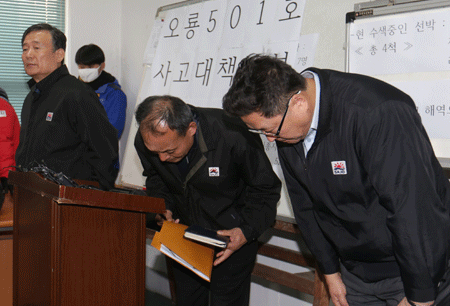- California Assembly OKs highest minimum wage in nation
- S. Korea unveils first graphic cigarette warnings
- US joins with South Korea, Japan in bid to deter North Korea
- LPGA golfer Chun In-gee finally back in action
- S. Korea won’t be top seed in final World Cup qualification round
- US men’s soccer misses 2nd straight Olympics
- US back on track in qualifying with 4-0 win over Guatemala
- High-intensity workout injuries spawn cottage industry
- CDC expands range of Zika mosquitoes into parts of Northeast
- Who knew? ‘The Walking Dead’ is helping families connect
Sunken trawler shifts focus to ownership group

Sajo Industries officials bow in apology as the company’s CEO, Kim Jeong-su, left, stands nearby at the firm’s offices in Busan, Tuesday. (Yonhap)
By Kim Young-jin
The sinking of the Oryang 501 in the Bering Sea this week has raised questions anew about Korean fishing giant Sajo Group, which owns the vessel and has long been accused of abuses on the high seas.
Dating back to 2010, the conglomerate has been accused of alleged human rights and labor abuses, and illegal fishing. The company has faced legal action at home and internationally for its practices.
Activists say that because fishing companies do their work on the high seas, the industry is difficult to regulate, leaving the door open for abuses of power as well as overfishing.
Sajo’s string of mishaps began in August of 2010, when its trawler Oyang 70 sank off the coast of New Zealand, killing six.
A coroner in New Zealand found last year that the Korean ship was trawling for southern blue whiting, when a large catch caused the vessel to list.
According to the coroner, Richard McElrea, the captain refused to throw fish away and tried to bring the nets on board, the New Zealand Herald reported.
The problems deepened in 2011, when 32 Indonesian crewmembers walked off the Oyang 75, alleging forced labor, unpaid wages and physical and sexual abuse.
Sajo Industries — the operator of the Oryang 501 — and Sajo Oyang are subsidiaries of the conglomerate.
The 2011 case became a flashpoint exposing widespread allegations of labor abuses aboard Korean-flagged vessels in international waters. Foreign sailors, particularly those from Indonesia, alleged that they were subjected to underpayment, poor working conditions and verbal and physical abuse.
Earlier this year, the Seobu District Court handed suspended sentences to a former CEO and mid-level manager of Sajo Industries for forging documents to prove they had paid workers aboard the Sajo Oyang 75.
According to reports out of New Zealand, the embattled Oyang 75 now faces forfeiture to the New Zealand government for fisheries violations including fish dumping.
In September, the Oyang 77 was forfeited to New Zealand after it was found that its captain, Lee Dae-jun, had illegally dumped fish and misreported his catch.
Lee had dumped 53 tons of fish that he had deemed small or unmarketable and filled his vessel with higher-quality fish.
Following allegations of abuses in the industry, the Ministry of Oceans and Fisheries announced a set of measures to improve conditions including the creation of a call center for foreign fishermen.
An official told The Korea Times that the ministry had carried out on-site inspection of vessels last year, but that these had been limited due to what he called a lack of staff and budget.
















